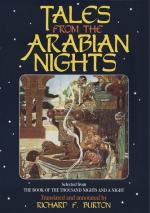Midnight until 2 a.m. is represented by the Rat.
2 a.m. until 4 a.m. is represented by the Ox. 4
a.m. until 6 a.m. is represented by the Tiger. 6
a.m. until 8 a.m. is represented by the Hare. 8 a.m.
until 10 a.m. is represented by the Dragon.
10 a.m. until noon is represented by the Serpent.
Noon until 2 p.m. is represented by the Horse.
2 p.m. until 4 p.m. is represented by the Ram.
4 p.m. until 6 p.m. is represented by the Ape.
6 p.m. until 8 p.m. is represented by the Cock.
8 p.m. until 10 p.m. is represented by the Hog.
10 p.m. until midnight is represented by the Fox.
See p. 27 Edit. ii. of C. B. Mitford’s Tales of Old Japan, a most important contribution to Eastern folklore.
["Darajah” is, however, also used for any short space of time; according to Lane It is=4 minutes (i.e. the 24 hours or 1,440 minutes of the astronomical day divided into 360 degrees of 4 minutes each), and Bocthor gives it as an equivalent for our instant or moment.—St.]
[FN#138] The young fool vaunts his intersexual powers, apparently unknowing that nothing can be more fatal to love than fulfilling the desires of a woman who, once accustomed to this high diet, revolts against any reduction of it. He appears to have been a polisson by his own tale told to the Caliph and this alone would secure the contempt of a high-bred and high-spirited girl.
[FN#139] The “nosebag”; vol. ii. 52, etc. The Badawiyah (Badawi woman) generally prefers a red colour, in opposition to the white and black of civilisation; and she of the Arabian Desert generally disdains to use anything of the kind.
[FN#140] This ablution of the whole body he was bound to perform after having had carnal knowledge of a woman, and before washing he was in a state of ceremonial impurity. For “Ghusl,” or complete ablution, see vol. v. 80.
[FN#141] “The Heart of the Koran,” chap. xxxvi. see vol. iv. 50.
[FN#142] The Mandil apparently had been left in the shop by the black slave-girl. Women usually carry such articles with them when “on the loose,” and in default of water and washing they are used to wipe away the results of car. cop.
[FN#143] In Arab. “Shakk.” The criminal was hung up by the heels, and the executioner, armed with a huge chopper, began to hew him down from the fork till he reached the neck, when, by a dextrous turn of the blade, he left the head attached to one half of the body. This punishment was long used in Persia and abolished, they say, by Fath Ali Shah, on the occasion when an offender so treated abused the royal mother and women relatives until the knife had reached his vitals. “Kata’ al-’Arba’,” or cutting off the four members, equivalent to our “quartering,” was also a popular penalty.
[FN#144] In text “Ghibtu ’an al-Dunya,” a popular phrase, meaning simply I fainted.
[FN#145] This was done to staunch the blood: see the salt-wench in vol. i. 341.




